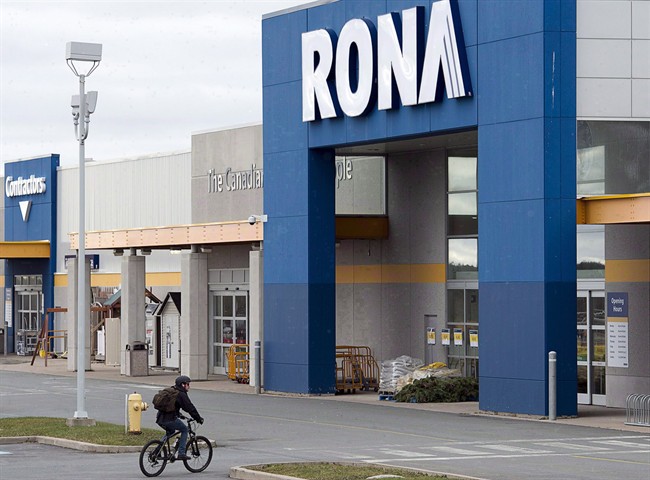BOUCHERVILLE, Que. – Rona has decided not to sell its network of big box stores outside Quebec as the home renovation retailer attempts to build a turnaround by improving the customer experience, its new CEO said Tuesday.

“If you have a happy customer that’s coming into your store and he’s leaving satisfied it helps to get him to come back,” Robert Sawyer, a former food retailing executive, said after speaking to shareholders for the first time.
He said lessons he learned in the highly competitive grocery business are just as useful in the home renovation industry.
Sawyer said his predecessors didn’t do a bad job but were unable to digest years of acquisitions once the recession hit.
“So I have to get back to basics, to look at merchandising, procurement, supply chain and marketing to see how we’re going to address to our consumers all over every region in Canada,” he told reporters.
That could mean producing regional flyers that cater to varying consumer demands instead of offering uniform specials across the country.
Sawyer said he plans to unveil his strategy next quarter, but the chain has decided not to sell its network of big box stores outside Quebec even as it focuses on smaller, proximity stores.
“We have all the ingredients for success. Now we need to optimize the recipe to achieve the full potential of this magnificent organization,” he told shareholders.
Prior to his arrival five weeks ago, the Quebec-based company said it was taking “a hard look” at either selling or reducing the size of its 30 big box retail stores outside Quebec that generate about $750 million of annual sales but together are losing money.

Get weekly money news
But Sawyer said most of the stores are profitable and selling them would have a big impact on the company’s distribution network.
Rona chairman Robert Chevrier said the stores are part of a network of stores of varying size that provide a competitive advantage over U.S.-based rivals such as Home Depot and Lowe’s.
Selling the stores would diminish the value of the remaining network and tarnish how people perceive the brand, he said.
Chevrier conceded that the company’s new leadership is under pressure to turn things around.
“It’s obvious that if collectively, the people up here, Robert’s team, does a bad job I think we deserve to be kicked out,” he said.
Rona will announce in a few weeks whether it will sell its commercial and professional division that has about $500 million of annual sales.
Its current strategic plan calls for the closure of 10 underperforming big box stores and reducing the size of 13 others. Five stores have been closed so far.
In Quebec, the company has also started to reposition its Reno-Depot banner as a warehouse by reducing the number of products, but offering bigger quantities at better prices.
Rona said it has achieved $17 million of savings, or about 40 per cent of the up to $45-million target from administrative job cuts and the renegotiation of major service agreements.
Sawyer told shareholders that the company’s future is “very promising.”
Still, Rona (TSX:RON) reported a loss of $40 million or 33 cents per share for the quarter compared with a loss of $12.4 million or 11 cents a year ago.
On an adjusted basis, the company said it lost $22.7 million or 19 cents per share for the quarter ended March 31 compared with a loss of $13.5 million or 11 cents per share a year ago.
Analysts on average had expected a loss of 14 cents per share, according to Thomson Reuters estimates.
Revenues were $929.4 million, down $4.6 million from a year ago. Same-store sales fell 0.8 per cent, or three per cent in the retail division as cold weather caused a 28 per cent drop in the sale of seasonal items.
The company’s distribution segment experienced higher sales but that was offset by lower revenue from Rona’s retail and commercial segments.
Rona attributed the weaker results to disruptions in its operations due to changes at its Reno-Depot and Totem banners, increased costs of building materials, difficult market conditions and a late spring.
“We expect that fiscal 2013 will be another demanding year, because of the repositioning that will temporarily disrupt our operations,” said chief financial officer Dominique Boies.
He said the outlook for 2014 is better as Canadian housing starts are expected to increase and Rona will fully benefit from cost reductions.
Irene Nattel of RBC Capital Markets said that with a new CEO and chief commercial officer, 2013 “is best viewed as a transitional year.”
“Weaker than expected first-quarter results underscore the macro headwinds and operating challenges,” she wrote in a report.
On the Toronto Stock Exchange, Rona’s shares closed down 51 cents, or 4.8 per cent, to $10.12.







Comments